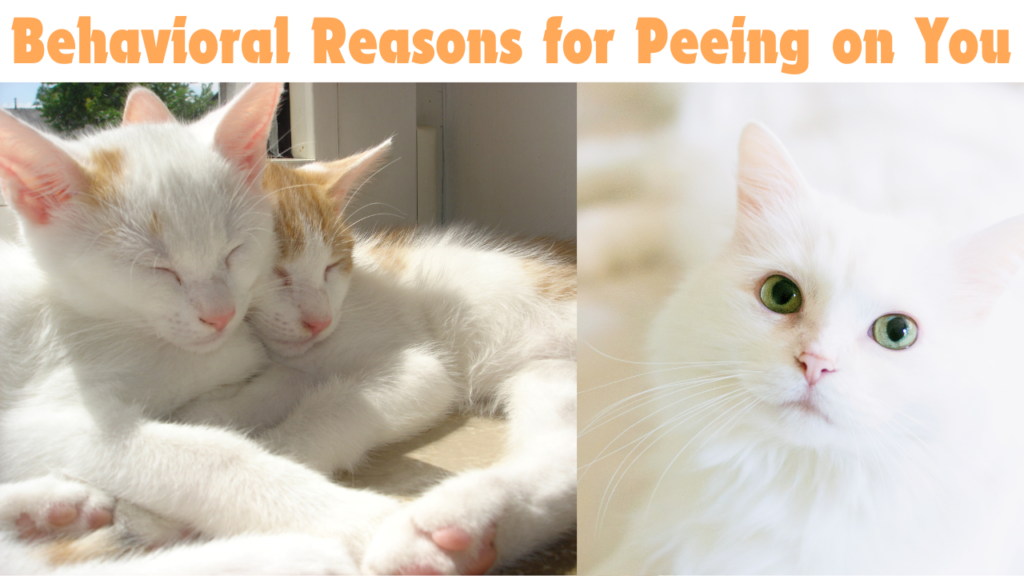It can be distressing when your beloved cat urinates on you, especially when you’re unsure of the reason behind such behavior. Cats are usually very clean animals, and any deviation from this norm can be perplexing. Cat urine accidents can be a sign of a variety of issues, ranging from health problems to behavioral changes. In this article, we will explore the possible causes for this behavior, as well as the steps you can take to correct it.
Possible Medical Causes of Urinating on You
Urinary Tract Infections (UTIs)
One of the most common health-related reasons why a cat may urinate on its owner is due to a urinary tract infection (UTI). UTIs are painful for cats, and they often cause them to urinate frequently or in inappropriate places. A cat with a UTI might also have blood in its urine, and the urine may have a foul odor.
If you suspect a UTI, it is important to consult with your veterinarian as soon as possible. UTIs require medical treatment, usually antibiotics, to clear the infection and relieve the discomfort your cat is experiencing.
Bladder Issues and Stones
Bladder stones or crystals can also cause a cat to urinate outside of the litter box. These conditions often result in painful urination and frequent attempts to urinate, which may lead to accidents. Cats with bladder stones might urinate in unusual places to relieve the discomfort caused by this condition.
Veterinary attention is crucial to diagnose bladder issues. Treatment may involve dietary changes, medication, or, in some cases, surgery to remove the stones.
Kidney Disease
Chronic kidney disease (CKD) is another common medical issue in older cats. Cats with CKD may have trouble holding their urine, which can result in accidents. This condition often presents other symptoms such as increased thirst, weight loss, and lethargy.
A veterinarian can perform tests to diagnose kidney disease.Early diagnosis can assist in managing the condition and enhancing your cat’s overall well-being.
Diabetes
Diabetes is another condition that can cause frequent urination in cats. Cats with diabetes may show symptoms of increased thirst and weight loss. If your cat is urinating on you and also showing signs of increased hunger or thirst, diabetes could be the underlying issue.
Managing diabetes requires insulin injections and a specialized diet. Your vet can guide you in managing your cat’s condition.
Behavioral Reasons for Peeing on You
If medical issues are ruled out, the cause of your cat’s behavior may be rooted in stress or behavioral changes. Cats are highly sensitive creatures, and any changes in their environment can lead to unusual behaviors, including urinating on their owners.

Stress and Anxiety
Cats are creatures of habit, and even small changes to their routine or environment can cause them significant stress. Moving to a new home, the introduction of a new pet, or changes in the family dynamic can make your cat feel insecure. In response to these stressors, your cat may urinate on you as a way of marking its territory or seeking comfort.
Addressing the root cause of your cat’s anxiety is essential. Providing your cat with a safe space, maintaining a consistent routine, and using pheromone diffusers designed for cats can help alleviate stress.
Territorial Behavior
Cats are inherently territorial creatures and may mark their space by urinating. If your cat feels that its space is being threatened, it may begin to urinate on its owner or other objects in the home. This behavior is more common in unspayed or unneutered cats, but it can also occur in spayed or neutered cats if they feel their territory is at risk.
To prevent territorial marking, consider providing your cat with plenty of vertical space such as cat trees and shelves, which allow them to feel secure and in control of their environment.
Litter Box Issues
If your cat is urinating on you, it may be a sign that there is something wrong with its litter box. Cats are very particular about their litter boxes, and they may avoid using one that is dirty, too small, or in a location that feels unsafe.
Ensure your cat’s litter box is clean, spacious, and located in a quiet, private area. Some cats may also prefer certain types of litter, so experimenting with different options could help. If your cat is avoiding the litter box, try adding more boxes in different locations around the house to provide more options.
How to Stop Your Cat from Peeing on You
If your cat has started peeing on you, it is essential to address the underlying cause, whether medical or behavioral. Here are some steps you can take to prevent further accidents:
1. Visit the Veterinarian
If you suspect that your cat’s behavior is due to a medical issue, the first step is to take your cat to the vet. A thorough examination, including urinalysis, blood tests, and possibly an ultrasound, can help identify any medical conditions that may be causing the urination.
2. Address Behavioral Triggers
If stress or anxiety is the cause of your cat’s behavior, work on eliminating the triggers. This may involve providing more hiding places, offering comfort items such as a blanket with your scent, and using calming pheromone products to reduce anxiety.
3. Maintain a Clean and Accessible Litter Box
Ensure that your cat’s litter box is kept clean and is placed in a location where your cat feels comfortable. Provide multiple litter boxes if you have several cats, and try Various Different kinds of litter to discover your cat’s preference.
4. Positive Reinforcement
Reward your cat with praise or a small treat when it uses the litter box properly.Positive reinforcement encourages good behavior and motivates your cat to keep using the litter box.
5. Consider Professional Behavior Training
If behavioral issues persist, it may be helpful to consult a professional cat behaviorist. These experts can assess your cat’s behavior and provide targeted strategies to address any anxiety, aggression, or territorial issues that might be causing the urination.
Conclusion
Urinating on its owner is not typical cat behavior, but understanding the potential causes and solutions can help resolve the issue. Whether the cause is a medical condition or stress-related, addressing the problem as soon as possible is crucial for both your cat’s well-being and your own peace of mind. By visiting the vet, addressing behavioral issues, and ensuring your cat’s environment is comfortable and stress-free, you can work towards stopping this behavior and maintaining a happy and healthy relationship with your feline friend.
#: READ ANOTHER POSTS
1 : How to Measure Your Cat’s Heart Rate While Purring: A Comprehensive Guide
2 : Why Is My Cat Not Gaining Weight? Causes, Solutions, and Essential Tips


